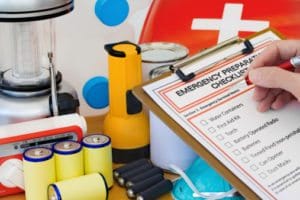No one knows when an emergency will hit and being prepared will help reduce the risk of additional problems – especially for those with asthma, food allergy or celiac disease. Whether hurricanes, floods or wildfires are driving you out of your home, there are few basics that can save time and stress in any evacuation situation.
Keep your gas tank full and create a plan of where you will go if you need to leave in a hurry. Shelters and well-meaning friends may not be asthma or allergen aware. When possible, research and identify a location that provides accommodations with a kitchen or cooking facilities. Designate an out-of-town contact person to call in the event of an emergency. Family and friends can help to save your smartphone’s battery by calling this person instead of you.
Basic Emergency Supplies
Keep a duffel bag within easy reach that is filled with basic necessities. It should include the following:
- List of accommodations including phone numbers and addresses
- Flashlight and fresh batteries
- Battery operated radio (note: solar may not work if skies are dark)
- First aid kit
- Blankets
- Manual can opener
- Canned foods, energy bars and shelf-stable foods that are safe and satiating. Individually packaged items such Sunbutter packets, rice or soy milk boxes are good on-the-go choices.
- Disposable bowls, plates, forks, spoons, cups and napkins
- Bottled waters and electrolyte drinks (one gallon of water per person per day)
- Ziploc bags for trash and to keep foods fresh
- Grooming items such as allergen-safe soap, toothpaste and shampoo
- Hand wipes and sanitizers
- Whistle
- Car chargers for phones
- If applicable: pet-care items, baby items, feminine products
Important documents to store in fire and/or waterproof containers:
- Cash in the event there are no ATMs or banks open
- Important documents, such as insurance, medical records, passports, deeds, wills and other hard to replace information
Be Medically Prepared
Emergency kits require a few extra items and careful planning for those with asthma, allergies or celiac disease.
- Emergency Action Plans for food allergy, asthma or other disease. Stress during an emergency may cause you to forget simple procedures.
- Medical Information Sheet detailing physician names and contact information, health insurance provider account number and contact data, prescription drug list with pharmacy name, refill numbers, name of prescribing physician, dosing and frequency.
- Supply of prescription medications, such as epinephrine auto-injectors, asthma maintenance drugs, inhalers, nebulizer medications.
- Over-the-Counter medications, since stores may be closed, such as antihistamines, eye drops, fever reducers.
- Portable battery-operated nebulizers with car adapters.
For Wild, Wet Weather
Dealing with hurricanes, flooding or drenching? Switch to a waterproof duffel bag and load it with:
- Waterproof bags for food and electrical items
- Waterproof hard cases for medications
- Rubber or waterproof boots
- Extra clothing
When Things Get Hot
Wild fire and compromised air quality challenges? Pack the following:
- Bandana to dampen and place over mouth
- Respirator or strong face mask for those with severe asthma (see physician to better understand what type to purchase)
- Eye goggles to protect eyes from irritation
Keep your Emergency kit fresh and replenish every few months.
For more tips on how to effectively prepare for the worst, check out these helpful resources:
- Allergy and Asthma Foundation of America (AAFA): Hurricanes – Weathering the Storm with Asthma
- FARE: Food Allergy Disaster Preparedness
- American Red Cross: Emergency Preparedness
- Canadian Red Cross: Emergency Preparedness
- U.S. Government: How to Prepare for a Natural Disaster
- FARE: Managing Students with Food Allergies during a Shelter-in-Place Emergency
Article updated: September 2022
Read more:
Wild Weather and Our Allergies and Asthma
Thunderstorm Asthma: From When and Why It Happens, To Risks with Pollen Allergies
Thunderstorm Asthma: How to Be Prepared






